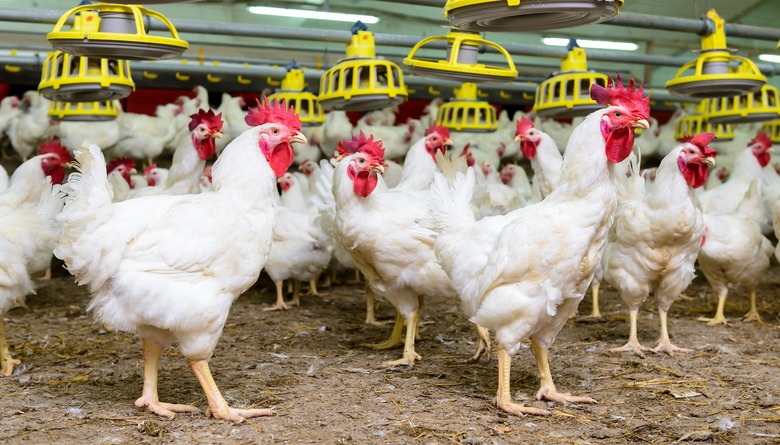McDonald's New Humane Chicken Policy Trades Electrocution For 'Controlled Atmospheric Stunning'
McDonald's recently made significant changes to its meat supply by minimizing antibiotic use in poultry products. Now, the company is requiring suppliers to slaughter their chickens more humanely. The Los Angeles Times reports that birds sold to the chain will no longer be electrocuted, shackled by the feet to conveyors, and have their throats slit.
Instead, they'll be raised in brightly lit, uncrowded housing environments that allow them to socialize and experience natural behaviors such as pecking, perching, and dust-bathing. In the U.S. and Canada, chickens will be killed via controlled atmospheric stunning (CAS) — a method in which animals are placed in a container filled with an asphyxiating gas that causes unconsciousness. CAS is already practiced by McDonald's suppliers throughout Europe and Australia.
These new standards will apply to 70 percent of the chain's global chicken supply effective by 2024. Furthermore, the burger giant said it would experiment with the economics of changing other practices like how their poultry is bred, how quickly the birds grow, and how densely they're housed.
"As one of the world's largest food companies, we aim to use our scale as an opportunity to achieve impactful change on key societal issues, and we will continue to collaborate with our suppliers, franchisees and employees to achieve real impact," McDonald's said in a statement.
Humane Society of the United States president and CEO Wayne Pacelle applauds McDonald's move, but doesn't think it's quite good enough.
"It failed to act on the most severe problem within its poultry supply chain, allowing its suppliers to use breeds of chickens that have chronic health problems; the birds are extremely obese and grow so rapidly that some of them have a hard time standing or walking," Pacelle said in a blog post. "And it's not taking steps other companies, including competitors like Burger King, Jack in the Box, Subway, and Sonic, have taken on space allotments for the birds or enrichments in the barns."
#ICYMI: @KraftHeinzCo pledged to abide by a series of welfare reforms for chickens raised for meat. More: https://t.co/1wkM4QE7vn pic.twitter.com/Ycwyl0OxYB
— Humane Society (@HumaneSociety) October 30, 2017
In the end, he thinks the announcement from McDonald's is "disappointing," but says he will continue to engage with the company and urge others to continue looking at how they can better the way they treat their livestock. For more on the Golden Arches, check out these 11 things you didn't know about McDonald's.
